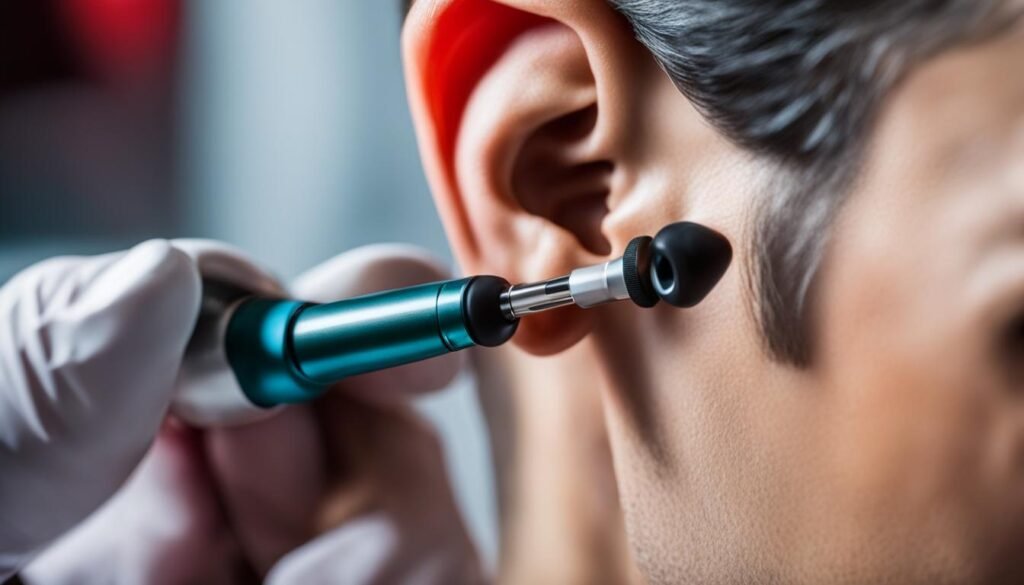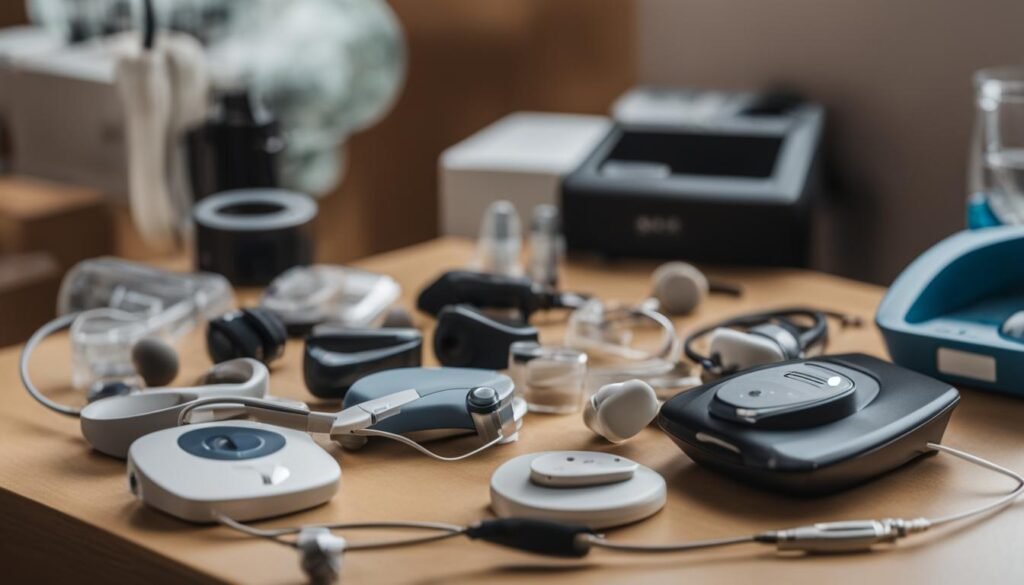How to Know if Hearing Loss Is Permanent is essential for anyone facing auditory issues. Hearing loss, a condition affecting many can be either temporary or permanent and stems from a variety of causes, including loud noise exposure, infections, head injuries, certain medications, and genetic predispositions. Recognizing the signs of permanent hearing loss is vital for deciding the best action.
When you suspect hearing loss, immediate action and a professional hearing test are crucial to identify the nature and extent of the condition. Understanding and identifying permanent hearing loss enables you to seek appropriate treatments and adapt to manage your hearing effectively.
Key Takeaways:
- Permanent hearing loss can be caused by various factors and is characterized by irreversible damage to the hearing pathway.
- Signs of permanent hearing loss include difficulty hearing in noisy environments, trouble understanding speech, asking people to repeat themselves, and experiencing buzzing or ringing in the ears.
- Getting a comprehensive hearing test from an audiologist is the best way to determine the type and severity of your hearing loss.
- Treatment options for permanent hearing loss include hearing aids, cochlear implants, and assistive listening devices.
- It is important to take preventive measures to protect your hearing and seek early intervention if you suspect hearing loss.
Causes and Types of Hearing Loss
Various factors can cause hearing loss and can be classified into different types based on the underlying cause. Understanding the causes and types of hearing loss is crucial in determining the appropriate treatment options and management strategies.
Causes of Hearing Loss:
- Exposure to loud noise: Prolonged exposure to loud sounds, such as machinery, music concerts, or firearms, can damage the delicate structures of the inner ear.
- Infections: Certain infections, such as otitis media or ear infections, can lead to temporary or permanent hearing loss if left untreated.
- Head injuries: Traumatic head injuries can affect the auditory system and result in hearing loss.
- Medications and chemicals: Certain medications and chemicals, including some antibiotics and chemotherapy drugs, can have ototoxic effects and impair hearing.
- Genetic factors: Inherited genetic mutations can contribute to hearing loss, which may be present from birth or develop later in life.
Types of Hearing Loss:
- Sensorineural hearing loss: This type of hearing loss occurs when there is damage to the inner ear or the auditory nerve. It is the most common hearing loss and can be caused by ageing, exposure to loud noise, genetics, and other factors.
- Conductive hearing loss: Conductive hearing loss is characterized by a problem in the outer or middle ear, which prevents sound from reaching the inner ear. Earwax buildup, ear infections, fluid in the middle ear, or abnormalities in the ear canal or middle ear bones can cause it.
- Mixed hearing loss: Mixed hearing loss is a combination of sensorineural and conductive hearing loss, where both the inner and outer/middle ear are affected.
- Presbycusis: Presbycusis is a type of sensorineural hearing loss associated with ageing. It typically affects high-frequency sounds and is a common cause of hearing loss in older adults.
Understanding the causes and types of hearing loss is the first step toward effective management. Identifying the underlying cause and consulting with an audiologist can help determine the most suitable treatment options and support strategies for individuals with hearing loss.
Symptoms and Diagnosis of Permanent Hearing Loss
Hearing loss can significantly impact your daily life, making communicating and engaging with others difficult. Recognizing the symptoms of hearing loss is crucial for early detection and appropriate intervention. If you suspect hearing loss, it is essential to seek professional help and undergo a thorough diagnosis to determine the type and severity of your condition.
Common signs of hearing loss include experiencing difficulty hearing in noisy environments, struggling to understand speech, frequently asking people to repeat themselves, and hearing buzzing or ringing sounds in the ears. These symptoms can vary in severity and may worsen over time if left untreated. If you notice any of these signs, scheduling an appointment with an audiologist is recommended.
An audiologist is a hearing healthcare professional trained to assess and diagnose hearing loss. During your visit, the audiologist will conduct a comprehensive hearing evaluation, which may include various tests to measure your ability to hear different frequencies and speech sounds. These tests provide valuable insights into the type and extent of your hearing loss, allowing the audiologist to develop a personalized treatment plan.
Learn the truth behind whether hearing aids cause hearing loss: Unsure About Your Hearing? How to Know if Hearing Loss Is PermanentGetting a Hearing Test
To diagnose permanent hearing loss accurately, a professional hearing test is necessary. While online hearing tests may provide a general overview, they cannot replace the expertise and precision of an audiologist’s assessment. By visiting an audiology clinic, you can benefit from advanced diagnostic equipment and the knowledge and experience of trained professionals.
“Obtaining a proper diagnosis is crucial in managing permanent hearing loss. By seeking the expertise of an audiologist, individuals can receive personalized care and guidance on the most suitable treatment options for their specific needs.”
It is important to note that you do not need a referral from a doctor to see an audiologist. You can make an appointment at an audiology clinic to test your hearing. This proactive step can help you better understand your hearing health and pave the way for appropriate interventions to improve your quality of life.

Treatment Options for Permanent Hearing Loss
When managing permanent hearing loss, several treatment options can greatly improve an individual’s quality of life. The most common and effective treatment option is the use of hearing aids. These small devices amplify sounds and enhance the wearer’s hearing and communication ability. Whether it’s a conversation with a loved one or listening to your favourite music, hearing aids can make a significant difference in your day-to-day life.
Cochlear implants may be recommended in more severe cases of permanent hearing loss. A cochlear implant is a surgically implanted device that bypasses damaged parts of the inner ear and directly stimulates the auditory nerve. This allows individuals with severe to profound hearing loss to perceive sound and speech more clearly. Cochlear implants can be life-changing for those without hearing aids alone.
“Hearing aids can make a significant difference in your day-to-day life.”
In addition to hearing aids and cochlear implants, other assistive listening devices can enhance the listening experience. Personal amplifiers, for example, can be used to amplify specific sounds or voices in challenging listening environments. These devices are particularly helpful when background noise may make focusing on speech or important sounds difficult. Headphones and telecoil systems are commonly used assistive devices that can improve hearing in various settings.
It’s important to note that the Australian Government’s Hearing Services Program provides eligible individuals with fully subsidized hearing assessments, devices, and support services. This program aims to make hearing healthcare more accessible and affordable for those who need it.

Treatment Options for Permanent Hearing Loss:
- Hearing aids
- Cochlear implants
- Assistive listening devices
No matter the severity of your permanent hearing loss, treatment options are available to help improve your ability to hear and communicate. It’s important to consult with a hearing healthcare professional to determine the most appropriate treatment plan for your specific needs.
Find out how long does hearing loss last after sinus infection: Unsure About Your Hearing? How to Know if Hearing Loss Is PermanentConclusion
Managing hearing loss is essential for better quality of life and overall well-being. Living with hearing loss can be challenging, but with proper management, individuals can maintain a strong connection to the world around them.
Early intervention plays a crucial role in addressing hearing loss. If you suspect hearing loss, seeking a hearing test is the first step towards understanding the type and severity of your condition. This knowledge enables healthcare professionals to prescribe appropriate treatment options for you.
Preventing further hearing loss is equally important. You can safeguard your hearing by limiting exposure to loud noise and protecting your ears in noisy environments. Taking preventive measures can significantly reduce the risk of permanent hearing loss.
By taking control of your hearing health and following the advice of professionals, you can effectively manage permanent hearing loss and lead a fulfilling life. Remember, seeking early help and implementing preventive strategies are key to maintaining good hearing health.
FAQ
What are the causes of hearing loss?
Hearing loss can be caused by exposure to loud noise, infections, head injuries, certain medicines and chemicals, and genetic factors.
What are the different types of hearing loss?
There are three main types of hearing loss: conductive hearing loss, sensorineural hearing loss, and mixed hearing loss.
What is presbycusis?
Presbycusis is a type of sensorineural hearing loss caused by ageing and affects high-pitched sounds first.
What are the symptoms of hearing loss?
The symptoms of hearing loss can include difficulty hearing in noisy places, trouble hearing on the phone, asking people to repeat themselves, and hearing buzzing or ringing in the ears.
How can I get a hearing test?
If you suspect hearing loss, seeing an audiologist for a hearing test is important. Online hearing tests can provide a general guide but are not as accurate as a test performed by an audiologist.
What are the treatment options for hearing loss?
Hearing loss treatment options include hearing aids, cochlear implants, and assistive listening devices.
Can hearing loss be reversed?
While some types of hearing loss can be reversed with medical or surgical intervention, most permanent hearing loss can be managed with hearing aids, cochlear implants, and other assistive listening devices.



